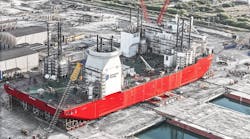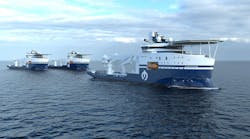Shipowners to operate from local units
Supply vessel owner and operator Bourbon has formalized a long-running collaboration in Nigeria, following new legislation from the government. This requires ship-owners active in the country’s maritime zone to operate via companies established in Nigeria, where possible owned 60% by indigenous people.
The new venture, Bourbon Offshore Interoil, has been formed with oilfield logistics specialist Interoil Services. At the time of the announcement last December, Bourbon’s Offshore Division general manager Christian Lefevre commented: “We have set ourselves the dual target of assuring local business commitments and setting up structures adapted to the requirements of the supermajors present in Nigeria.”
Currently, the joint venture can offer a fleet of 15 vessels, comprising four multi-purpose platform supply boats, one anchor-handler, and ten crew-boats. This year it has clinched a long-term contract from Shell to provide a range of services, including installations, for the Bonga project. These will be handled by two vessels: the MPSV Bourbon Emerald, a UT 745E design featuring diesel-electric propulsion, a large methanol storage capacity, and a heave compensated-crane capable of deploying loads of up to 70 metric tons; and the Bourbon Hydra, a UT745 also outfitted with large methanol capacity, and with firefighting class FIFI one. The venture’s other supermajor clients are ExxonMobil, Chevron and Total.
According to Bourbon’s Offshore Division business development director Gael Bodenes, the venture plans to commission new vessels where possible from the West Atlantic Shipyard in Port Harcourt. It already has two crew boats under construction at this site, with two more to follow, both standard Bourbon Surfer designs. “If we have confidence in the yard, we could procure heavier tonnage vessels in future,” Bodenes adds.
“The new law states that vessels must be built increasingly in Nigeria and operated by Nigerian crews. With this in mind, we have been training local personnel since the start of the year, our aim being to have our workboats crewed 100% by Nigerian nationals.”
Angola’s government is also pushing for more indigenous development, but accepts that construction quotas are harder to implement, as the country possesses no real shipyard. But there are similar pressures to establish joint ventures - in Bourbon’s case, it operates Sonasurf jointly with Sonangol.
This company has long-term contracts from BP for the Greater Plutonio development in Angola’s Block 18 and from Total for subsea developments in Block 17. The programs will be handled respectively by the Bourbon Helios and the Bourbon Hermese, delivered earlier this year from the Zhejiang shipyard in China; and by the Bourbon Jade, which according to Bodenes is the first multi-purpose PSV to be equipped with a 100-metric-ton-lift crane.•






